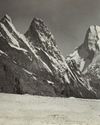
The date was set. Muhammad Ali would talk to Readers Digest on the morning of 11 September 2001, at his home, a 35 hectare farm. But when the hour arrived, the world was turned upside down. Ali agreed the interview should go on, but for several hours, the room was mostly quiet.
As the terrible events unfolded, he stared silently at the big screen television while the World Trade Center buckled and crumpled. And then Ali began to talk. His Parkinson's and his age (he turned 60 on 17 January) have turned him into a slow-motion version of his former self. Make no mistake, though, Muhammad Ali is in there, all of him.
Son of a sign painter and his Christian wife, heavyweight champ, poet and wit, black rights advocate, military draft resistor, philanthropist, father, and now grandfather six times over, the roles and causes Ali embraced remain a part of him, and from up close, you can see and hear them all.
You can feel his warmth as well. At one point, Assad Ali, 10, the youngest of his nine children, peeked into the room. The round faced, smiling boy stopped short, waiting to be acknowledged. Ali turned his head, his expression frozen, and slowly, wordlessly unfolded his body to create an opening. Assad ran to him, filled the space, hugged his dad and his father, hugged him back.
As images of Osama bin Laden began flashing across television, a transformation of sorts began for Ali. The man who started life as Cassius Clay and then announced his conversion to Islam in 1964 suddenly became only the second most recognizable Muslim face in the world.
This story is from the April 2023 edition of Reader's Digest India.
Start your 7-day Magzter GOLD free trial to access thousands of curated premium stories, and 9,000+ magazines and newspapers.
Already a subscriber ? Sign In
This story is from the April 2023 edition of Reader's Digest India.
Start your 7-day Magzter GOLD free trial to access thousands of curated premium stories, and 9,000+ magazines and newspapers.
Already a subscriber? Sign In

Calendar Girls
After Molly Baker’s husband died suddenly, her friends organized a year’s worth of support

THE GREAT WILDEBEEST MIGRATION
It's a spectacular sight when countless ruminants cross the Serengeti in search of greener pastures

Soumitra Chatterjee's Tryst with Destiny
The encounter that led a budding actor to a legendary filmmaker, and sparked an iconic creative partnership during the golden age of Bengali cinema

Frozen in Time
The life and work of Vittorio Sella, a pioneer of early mountain photography and the man behind some of the very first images of the Himalayas

HALLUCINATIONS
There was a monkey perched on the IV drip stand to the right of my hospital bed. It scowled at me, but I wasn’t afraid: A brief simian visit was part of my daily routine. I never questioned why there was a monkey in the hospital. I wasn’t lucid enough to recognize that my mind was playing tricks on me.

Music in the Air
Cuba is bursting with sound, and each region moves to its own defining rhythm

SHOULD YOU TRY A DETOX TREATMENT?
It's a popular new-year health habit. But science doesn't support it

Ringing True
He thought his late parents' wedding bands were gone forever

14,000-FOOT MIRACLE
The skydiver fully expected to die when her parachute failed to open. Instead, she's writing the next chapter of her life

I SURVIVED!
THREE UNUSUAL MEDICAL EMERGENCIES, AS TOLD BY THE PEOPLE WHO NEARLY DIED FROM THEM